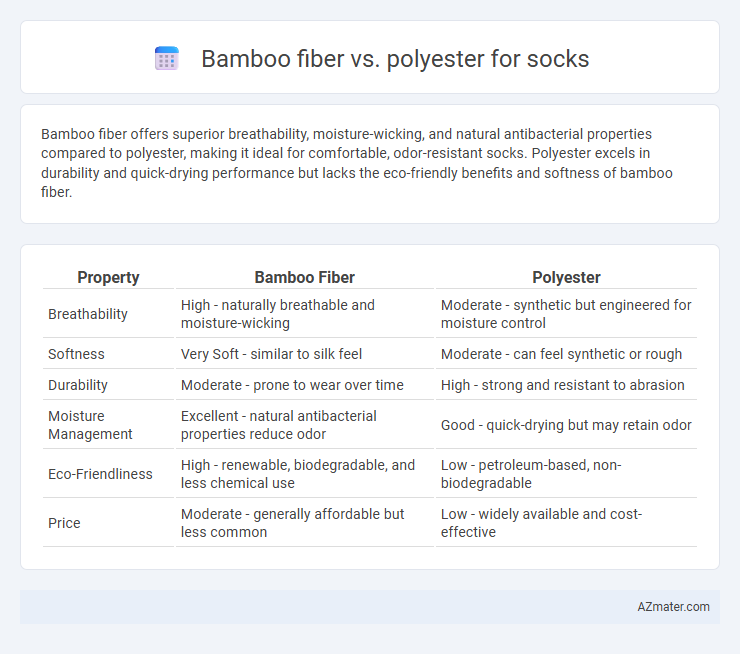Bamboo fiber offers superior breathability, moisture-wicking, and natural antibacterial properties compared to polyester, making it ideal for comfortable, odor-resistant socks. Polyester excels in durability and quick-drying performance but lacks the eco-friendly benefits and softness of bamboo fiber.
Table of Comparison
| Property | Bamboo Fiber | Polyester |
|---|---|---|
| Breathability | High - naturally breathable and moisture-wicking | Moderate - synthetic but engineered for moisture control |
| Softness | Very Soft - similar to silk feel | Moderate - can feel synthetic or rough |
| Durability | Moderate - prone to wear over time | High - strong and resistant to abrasion |
| Moisture Management | Excellent - natural antibacterial properties reduce odor | Good - quick-drying but may retain odor |
| Eco-Friendliness | High - renewable, biodegradable, and less chemical use | Low - petroleum-based, non-biodegradable |
| Price | Moderate - generally affordable but less common | Low - widely available and cost-effective |
Introduction to Bamboo Fiber and Polyester Socks
Bamboo fiber socks are crafted from natural bamboo pulp, offering superior breathability, moisture-wicking, and antibacterial properties that enhance comfort and reduce odor. Polyester socks, made from synthetic polymers, provide durability, elasticity, and quick-drying features ideal for active use and long-term wear. Both materials serve distinct purposes: bamboo fiber supports eco-friendly, soft, and hypoallergenic qualities, while polyester excels in strength, flexibility, and moisture resistance.
Material Composition: Bamboo Fiber vs Polyester
Bamboo fiber socks are composed of natural cellulose fibers derived from bamboo plants, offering superior breathability, moisture-wicking, and antibacterial properties compared to synthetic polyester fibers made from petroleum-based polymers. Bamboo fibers provide a soft, biodegradable, and hypoallergenic alternative, reducing environmental impact and skin irritation risks often associated with polyester socks. Polyester socks, while durable and cost-effective, typically retain heat and moisture, making bamboo fiber a preferred choice for comfort and sustainability in sock material composition.
Environmental Impact and Sustainability
Bamboo fiber socks offer superior environmental benefits compared to polyester, as bamboo is a fast-growing, renewable resource that requires minimal water and pesticides, reducing ecological footprint. In contrast, polyester is derived from non-renewable petroleum, contributing to microplastic pollution and higher carbon emissions during production. Choosing bamboo fiber promotes sustainable practices by enhancing biodegradability and reducing reliance on fossil fuels.
Comfort and Softness Comparison
Bamboo fiber socks offer superior breathability and moisture-wicking properties compared to polyester, enhancing overall comfort by keeping feet dry and cool. The natural fibers in bamboo provide a softer, more cushioned feel against the skin, reducing irritation often associated with synthetic polyester materials. Polyester socks, while durable and quick-drying, tend to trap heat and lack the luxurious softness found in bamboo fiber, making bamboo a preferred choice for comfort-focused sock wearers.
Breathability and Moisture-Wicking Abilities
Bamboo fiber outperforms polyester in breathability due to its natural micro-gaps that allow better air circulation, reducing foot sweat and odor. Its superior moisture-wicking abilities draw moisture away from the skin more efficiently, keeping feet dry and comfortable during extended wear. Polyester, while durable, tends to trap heat and moisture, making bamboo fiber socks a preferable choice for enhanced foot hygiene and comfort.
Durability and Longevity
Bamboo fiber socks offer moderate durability with natural antibacterial properties that reduce odor and moisture, making them ideal for everyday wear but prone to faster wear and tear compared to synthetic fibers. Polyester socks provide superior durability and longevity due to their strong synthetic fibers, making them resistant to stretching, shrinking, and abrasion during frequent use. For long-lasting performance and shape retention, polyester is often preferred, while bamboo fibers excel in comfort and breathability.
Odor Control and Antibacterial Properties
Bamboo fiber excels in odor control and antibacterial properties due to its natural antimicrobial compounds and high moisture-wicking ability, which reduce bacterial growth and keep feet dry. Polyester, being synthetic, lacks inherent antibacterial qualities and tends to retain moisture, leading to increased odor buildup during prolonged wear. Socks made from bamboo fiber provide a more breathable, hygienic option compared to polyester, especially for active or athletic use.
Skin Sensitivity and Hypoallergenic Features
Bamboo fiber is naturally hypoallergenic and antimicrobial, making it an excellent choice for sensitive skin and allergy sufferers, as it reduces irritation and allergies. Polyester, while durable, often lacks breathability and can trap moisture, potentially causing discomfort or skin irritation for sensitive individuals. Bamboo socks provide superior moisture-wicking and softness, enhancing comfort for those with delicate skin compared to conventional polyester options.
Price and Accessibility
Bamboo fiber socks often come at a higher price point due to the eco-friendly production process and limited manufacturing scale compared to polyester socks, which are widely available and generally more affordable. Polyester socks benefit from mass production and abundant raw materials, making them accessible in most markets worldwide. Consumers seeking sustainable options may find bamboo fiber socks less accessible but justify the premium for environmental benefits.
Final Verdict: Which Material is Best for Socks?
Bamboo fiber offers superior breathability, natural antimicrobial properties, and enhanced moisture-wicking, making it ideal for sensitive skin and all-day comfort in socks. Polyester provides high durability, better color retention, and cost-effectiveness, but lacks the eco-friendliness and softness of bamboo. For optimal sock performance with sustainability and comfort, bamboo fiber is the best material choice.

Infographic: Bamboo fiber vs Polyester for Sock
 azmater.com
azmater.com